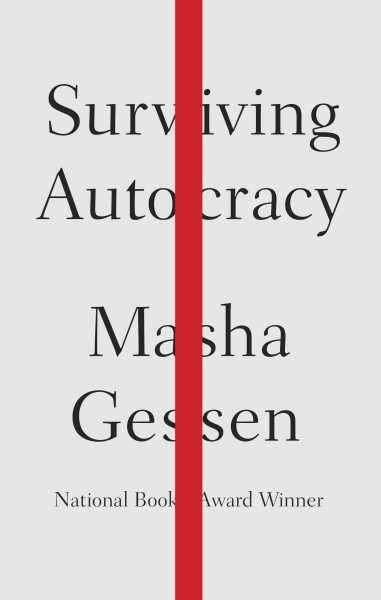
What does it mean to live in a “post-truth” moment? On one level, the ramifications are obvious: In a world where we can’t even agree on basic facts, persuasion and dialogue become all but impossible.
But the problem with post-truth might run even deeper. In their new book Surviving Autocracy, New Yorker staff writer Masha Gessen argues that the collapse of a common language, or a common experience of the world, is essentially the death of democratic politics as such. Politics, in Gessen’s words, is an ongoing discussion about how we’re going to live together tomorrow: “We can’t do politics if we can’t talk to one another … if we don’t inhabit a shared reality.”
Gessen grew up in the Soviet Union and spent many years covering the ascendance of totalitarian rule in that country. Their coverage of Trump and Trumpism has been among the best anywhere. But this book, more than any other Trump book I’ve read, focuses on “the corruption of language” and the subsequent loss of a collective space for what we typically think of as politics.
I spoke with Gessen by phone about the relationship between language and power, and why our inability to exist in the same reality is paving the way for authoritarian government.
A transcript of our conversation, lightly edited for length and clarity, follows.
Sean Illing
Hannah Arendt, the great 20th-century political theorist, had this notion of “thoughtlessness,” referring to the inability of people in totalitarian societies to think beyond clichés and slogans. How do you see the problem of thoughtlessness today?
Masha Gessen
When [Arendt] writes about totalitarian societies in particular, there’s something really important that is so hard to grasp. In the last chapter of The Origins of Totalitarianism, she talks about the difference between tyranny and totalitarianism. She says that under tyranny, a certain set of behaviors, a certain set of statements, is expected. A certain kind of performance from citizens is traded for some security that still leaves the person intact.
Whereas under totalitarianism, because of terror and because terror depends on being unpredictable, you never know what is expected of you. So you can’t perform totalitarianism in the same way. And this not knowing what you’re supposed to give the regime in order for it to leave you alone robs the individual of the very ability to form opinions, and I think that’s also at the root of this idea of thoughtlessness, because the goal of the totalitarian regime is to make it impossible to think.
Sean Illing
Robbing someone of their ability to form opinions is an interesting way to put it. Something similar happens in non-totalitarian societies, though it’s even harder to detect. This is why I wanted to ask you about language. For Arendt, at least, if all we know about politics comes to us via slogans and talking points and soundbites, then that doesn’t just determine how we talk about politics, it determines what’s actually thinkable in the first place.
Masha Gessen
Language determines what’s thinkable, right? I mean, it’s very hard to think a thought that you don’t have a word for — it’s impossible, in fact.
But there’s a huge difference between that limitation, which is just part of the human condition, and being in an encapsulated, ideological world that is divorced from the reality you can experience. And when Arendt writes about totalitarian ideology, she makes a very important point that any ideology can be totalitarian. And she writes that its key characteristic is that it’s entirely encapsulated; it’s impervious to any input from outside reality. So I think the problem with Fox News, or living inside the Fox News bubble, is not just the language and the framing, but it’s that the language and the framing actually do not apply to your daily reality.
I was talking to somebody the other day whose entire family has had Covid, and yet they don’t believe in Covid. And that is, like, a perfect example of totalitarian ideology. Even if they had said that it wasn’t that bad and not a lot of people are getting it, or something that acknowledged their personal experience — that would be one thing. But they literally do not think that the thing exists. They think that it’s a conspiracy.
Sean Illing
That’s wild. Is that sort of reality-denying ideology the precondition for actual totalitarianism?
Masha Gessen
Well, you had all these great German thinkers who survived fascism in the 1930s and ’40s, and they came to the US in the ’50s and ’60s and basically said the preconditions for fascism or totalitarianism were already in place here. But even suggesting that seemed outlandish at the time. You can’t use words like “fascism” without getting dismissed.
But look, there are really important distinctions between the country that I spent most of my life writing about and this one. And the distinctions may not be what’s important right now. Maybe what’s important right now are the similarities, and I don’t know that Donald Trump has the intellectual or organizational capacity to create state terror. I do believe he has a totalitarian ideology and he has been able to pull a huge number of people into his encapsulated world.
I guess the question is, how much state terror is necessary to create a totalitarian society?
Sean Illing
Not nearly as much as people might think.
Masha Gessen
Well, that’s the thing. We imagine terror as something that applies pressure directly, to every person in society at every living moment. Terror actually works by creating a sense of a credible threat to every person in society. And as if Trump weren’t enough, Covid came along and created the sense of a credible threat to every person in society, even if Trump doesn’t quite believe in Covid.
I mean, the Soviet Union in the 1970s did not have the gulag, did not even have particularly high rates of incarceration, did not jail everybody who was differently minded, just a few people. And that was enough. That was enough to maintain the stability and uniformity of thought, and just this sort of intellectual and moral desert.
Sean Illing
You’ve written about how Russia experienced this wave of truth and openness in those early years after the Soviet empire collapsed, and how it’s been rolled back so thoroughly by Putin and the strange nihilistic climate he’s helped engineer.
Masha Gessen
It turns out people can unsee and unthink true thoughts pretty easily. A few years ago, I went back to Russia, where some of the worst labor camps were, and visited someone I had interviewed there 20 years ago. She was an activist back then, and now she’s a Putinist. At first I thought she was joking when she said she was for Putin, then she said, “I just got sick of being a minority. I wanted to vote for someone who was going to win for once.”
And then we’re sitting there by this fire, in the old camps, and she said something about how killing all these people had been necessary to prepare for the war, that the gulag had been necessary. And I said, “Wait a second, what are you talking about?” I recounted all the crimes and all the numbers and what I read in the archives, and she just said, “Oh, they can write anything. They can write anything. They can say anything.”
This was the ultimate post-truth moment. She had seen the evidence. She spent most of her life working with these documents, and yet she could just dismiss them when they were inconvenient for the story that she had decided to buy in to.

Sean Illing
Connecting that back to the language, you write in the book that “when something cannot be described, it does not become a fact of shared reality.” And the kind of willful blindness you’re describing is only possible when language has been corrupted or shrunken down so much that the things we have to say simply aren’t sayable or thinkable — or at least not sayable or thinkable for enough people.
Masha Gessen
Right. Like I was saying earlier, you can’t speak something that you don’t have a word for, and you can’t describe what’s happening when the words you have [have] been emptied of meaning. I was writing about the experience of voting in the Soviet Union, which was called something else. It was called the free expression of citizen will, but in fact it was this experience of coercion and participation in an empty ritual.
It’s like if you and I went swimming together, but the whole time we were in denial about swimming, and we’re talking about it as though we had gone mountain climbing. And then five years later, I say to you, “Remember that time we went swimming.” But we never called it swimming. We always called it mountain climbing. And we can’t talk about it as swimming, because it’s still mountain climbing in the way we described it, in the way that we agreed to talk about it. But we didn’t experience any mountain climbing. We were wet and cold, and our shoes were full of sand, but none of that was part of an experience that we had agreed to share.
That’s kind of what it was like to live in the Soviet Union, and it’s a lot of what it’s like to live in Trump’s America.
Sean Illing
And what’s the straight line from the loss of a shared reality to a totalitarian society?
Masha Gessen
We can’t do politics if we can’t talk to one another. We can’t talk politics if we don’t inhabit a shared reality. We can’t have politics if we can’t agree on what we’re living through, because then we can’t discuss how we’re going to be living together tomorrow, which is what politics is.
Now, that doesn’t necessarily create the preconditions for totalitarianism, but I actually think that the complete elimination of politics is what authoritarianism is. Under authoritarianism, everybody goes home, has their private lives, cooks dinner, bakes bread, and the authoritarian individual or group accumulates money and power out of sight. So politics disappears entirely, public space disappears entirely. It’s like lockdown forever.
But totalitarianism is the opposite. The private space disappears and everything becomes political, but everything becomes political on the terms of the ruling ideology. So the authoritarian leader wants people to go home and tend to their lives. The totalitarian leader wants them out in the public square, demonstrating their support for him.
This is why there’s no doubt in my mind that Trump is a totalitarian-style leader. If he could, he would have the whole country at a Trump rally 24/7.
Sean Illing
You write in the book that the longer Trumpism lasts, the harder it will be to undo the damage he’s done to our political language. Is the real damage already done? What would it even mean to recover or reinvent political language?
Masha Gessen
I don’t think that it’s impossible, at this point, to recover. I spent most of my life writing about and living in a country where language had really been damaged to what I think might be the point of total disrepair. We’re not nearly that far along. A lot of people are thinking through how to write and talk about this era in ways that are better than we have talked about politics in the pre-Trump era. And there’s some incredible writing and talking that the Trump era has produced, so I think we still have a lot of potential if we get to reverse this in November.
Sean Illing
In the ’90s, Soviet journalists had to basically reinvent journalism in their country. Will the American press have to do the same? Can they do the same?
Masha Gessen
That’s a great question. Maybe I’m too optimistic, because I see a huge difference between the current conditions of American journalism and what it was like for Russian journalists in the ’90s. There are real conversations happening now about what “objectivity” means and what “moral clarity” looks like, and that’s all part of a reinvention process. Right now it’s hard because things move so fast, and there’s no attention span, and finding space for actual conversations is difficult. But a lot of good work is being done, and I think we can come to some kind of renewed understanding of journalistic practices — if not an entirely new understanding — on the other side of this.
Sean Illing
You say pretty clearly that our institutions won’t save us, and that means our next opportunity to reverse this autocratic drift is the November election. If that goes the other way, if Trump’s autocratic style is affirmed and rewarded with four more years, what then?
Masha Gessen
I don’t think we should be in the business of making predictions, but that’s a really dark scenario. That may mean that we miss our only chance to reverse the autocratic attempt, and then we would move into what the Hungarian sociologist Bálint Magyar calls “autocratic consolidation,” which essentially means that moving beyond Trump would require not the change of president, but the change of regime.
We already have such damage done to institutions, from the corruption of the Justice Department to the destruction of regulatory agencies to the dismantling of all oversight systems in the government itself. But we also have some incredible damage done to political culture and political language, as we discussed earlier. There will have to [be] real institutional repair and a total reinvention of how we think American democracy is represented institutionally.
Sean Illing
I take all of that to mean that if we move into this next stage of autocratic consolidation, we’re talking about a level of challenge that, almost by definition, would require something like a revolution to fix or to overcome.
Masha Gessen
Exactly.
Sean Illing
That’s scary.
Masha Gessen
I know.
Support Vox’s explanatory journalism
Every day at Vox, we aim to answer your most important questions and provide you, and our audience around the world, with information that has the power to save lives. Our mission has never been more vital than it is in this moment: to empower you through understanding. Vox’s work is reaching more people than ever, but our distinctive brand of explanatory journalism takes resources — particularly during a pandemic and an economic downturn. Your financial contribution will not constitute a donation, but it will enable our staff to continue to offer free articles, videos, and podcasts at the quality and volume that this moment requires. Please consider making a contribution to Vox today.
Sourse: vox.com






